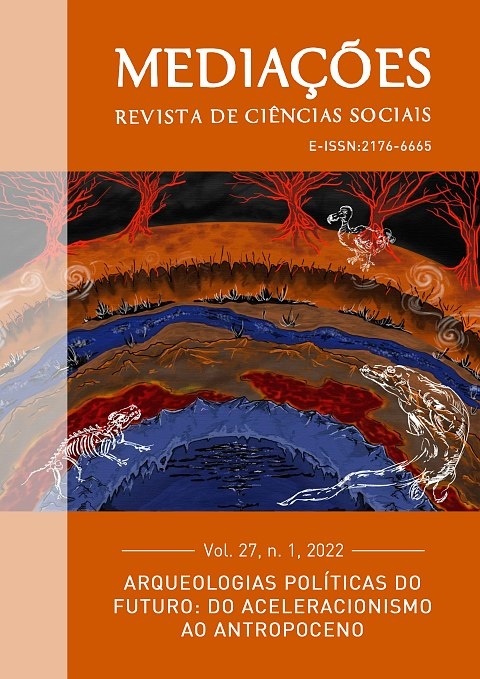Religious influence on the political tolerance about homosexuals: comparative analysis in Latin America
DOI:
https://doi.org/10.5433/2176-6665.2022v27n1e44055Keywords:
Religious influence, political intolerance, homosexuality.Abstract
The purpose of this article is to discuss the influence of religion on political tolerance about homosexuals and, equally, to identify which religious aspects are most prominent in the act of tolerating, through the three B's, belonging, believing and behaving. The empirical material comes from the Latin American Public Opinion Project (LAPOP), more specifically from the rounds of questionnaires from 2014 to 2019, applied in Brazil, Uruguay, El Salvador and Guatemala. It starts with the hypothesis (H1) that countries with the lowest tolerance rates have religiously active individuals, who attach greater importance to religion and are affiliated with more conservative religious denominations. Through linear regressions, as well as comparative analyzes, it was found that H1 was partially confirmed, because in only one round, significant differences were found between countries. Therefore, in general, the Protestant religious denomination also influences the four countries, causing a decrease in tolerance.
Downloads
References
BRASIL. Projeto de Lei do Senado n° 612, de 2011. Altera os arts. 1.723 e 1.726 do Código Civil, para permitir o reconhecimento legal da união estável entre pessoas do mesmo sexo. Brasília: Senado Federal, 2011. Disponível em: https://www25.senado.leg.br/web/atividade/materias/-/materia/102589. Acesso em: 6 abr. 2020.
BRASIL. Supremo Tribunal Federal. STF enquadra homofobia e transfobia como crimes de racismo ao reconhecer omissão legislativa. Brasília: STF, 2019. Disponível em: https://portal.stf.jus.br/noticias/verNoticiaDetalhe.asp?idConteudo=414010. Acesso em: 6 abr. 2020.
BRASIL. Supremo Tribunal Federal. Supremo reconhece união homoafetiva. Brasília: STF, 2011. Disponível em: http://www.stf.jus.br/portal/cms/verNoticiaDetalhe.asp?idConteudo=178931. Acesso em: 6 abr. 2020
BURDETTE, Amy M.; ELLISON, Christopher G.; HILL, Terrence D. Conservative protestantism and tolerance toward homosexuals: an examination of potential mechanisms. Sociological Inquiry, Austin, v. 75, n. 2, p. 177-196, maio 2005.
DJUPE, Paul A. (ed.). Religion and political tolerance in America: advances in the state of the art. Philadelphia: Temple University Press, 2015.
EISENSTEIN, Marie A. Rethinking the relationship between religion and political tolerance in the US. Political Behavior, [s.l.], v. 28, n. 4, p. 327-348, 15 nov. 2006.
GIBSON, James L.; TEDIN, Kent L. The etiology of intolerance. In: MIDWEST POLITICAL SCIENCE ASSOCIATION, 1986. Paper […]. [S.l.]: Midwest Political Science Association, 1986.
JELEN, Ted G.; WILCOX, Clyde. Denominational preference and the dimensions of political tolerance. Sociological Analysis, Worcester, v. 51, n. 1, p. 69, 1990.
LEEGE, David C.; WALD, Kenneth D.; KELLSTEDT, Lyman A. Religion and politics: a report on measures of religiosity in the 1989 NES Pilot Study. Phoenix: National Election Studies Board, 1996.
MACHADO, Maria das Dores Campos. Aborto e ativismo religioso nas eleições de 2010. Revista Brasileira de Ciência Política, Brasília, n. 7, p. 25-54, abr. 2012.
NUNN, Clyde Z.; CROCKETT, Harry J.; WILLIAMS JUNIOR, Allen. Tolerance and non conformity. San Francisco: Jossey-Bass, 1978.
PROTHRO, James W.; GRIGG, Charles M. Fundamental principles of democracy: bases of agreement and disagreement. The Journal of Politics, Chicago, v. 22, n. 2, p. 276-294,1960.
RIGGLE, Ellen D.; ELLIS, Alan L. Political Tolerance of Homosexuals: the role of group attitudes and legal principles. Journal of Homosexuality, New York, v. 26, n. 4, p. 135-147, mar. 1994.
SCHWADEL, Philip; GARNEAU, Christopher R. H. Sectarian religion and political tolerance in the United States. Sociology of Religion, Washington, v. 80, n. 2, p. 168-193, mai. 2019.
SELIGSON, Mitchell; MORALES, Daniel E. Moreno; RUSSO, Guilherme A. Education, the wealth of nations, and political tolerance toward homosexuals: a multilevel analysis of 26 countries in the Americas. Opinião Pública, Campinas, v. 25, n. 2, p. 234-257, ago. 2019.
SOTELO, Maria José. Political tolerance among adolescents towards homosexuals in Spain. Journal of Homosexuality, New York, v. 39, n. 1, p. 95-105, abr. 2000.
STEENSLAND, Brian et al. The measure of American religion: toward improving the state of the art. Social Forces, Chapel Hill, v. 79, n. 1, p. 291-318, 2000.
STOUFFER, Samuel A. Communism, conformity and liberties: a cross- section of the nation speaks its mind. Nova York: Doubleday, 1955.
SULLIVAN, John L.; PIERESON, James; MARCUS, George E. An alternative conceptualization of political tolerance: illusory increases 1950s-1970s. American Political Science Review, New York, v. 73, n. 3, p. 781-794, set. 1979.
SULLIVAN, John L.; PIERESON, James; MARCUS, George E. Political tolerance and American democracy. London: University of Chicago Press, 1982.
URUGUAY. Constitucion de la Republica Uruguay (1934). Peblicitada el 19 de abril de 1934. Disponível em: https://parlamento.gub.uy/documentosyleyes/constitucion. Último acesso em: 05 de abril de 2022.
WALD, Kenneth; HILL JUNIOR, Samuel; OWEN, Dennis. Political cohesion in churches. Journal of Politics, Austin, n. 52, p. 197-215,1990.
Downloads
Published
How to Cite
Issue
Section
License
Copyright (c) 2022 Naiara Sandi de Almeida Alcantara

This work is licensed under a Creative Commons Attribution 4.0 International License.
Copyright on articles published in Mediações belongs to the author(s): in the case of partial or entire republication of the original publication, we ask author(s) to indicate the original publication in the periodical.
Mediações uses the Creative Commons Attribution 4.0 International license, which allows Open Access, enabling any user to read, download, copy and disseminate its content so long as adequately referenced.
The opinions expressed by the author(s) are their sole responsibility.

































